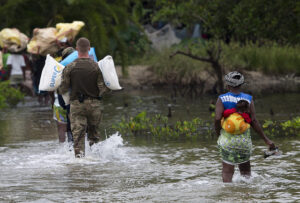Situated in West Africa on the Atlantic Ocean, Sierra Leone is known for its white-sand beaches and is rich in history. It covers approximately 74,714 km and has an estimated population of nearly 6 million. Rich in mineral resources, the country is a popular destination with corporate and business travelers. As such, we have been called – on occasion – to provide international business travel consulting services. Here is an incident report and travel recommendations on Sierra Leone.
Sierra Leone: Recent Natural Disaster

400 people have been confirmed dead, with a further 600 missing, following a mudslide and severe flooding which engulfed parts of Sierra Leone’s capital, Freetown. Residential areas in the hilltop community of Regent were engulfed by mud and floodwater early on Monday morning, after heavy rain caused part of nearby Sugar Loaf Mountain to collapse. The Red Cross has sent rescuers to the scene, whilst the United Nations has also mobilised local teams to help with the major rescue effort which is now underway.
Flooding is not unusual in Sierra Leone, and makeshift housing around Freetown – an overcrowded coastal city of over one million people – is often damaged or destroyed by heavy rains. Nevertheless, this latest disaster is believed to be the worst case of flooding in Africa in over 20 years. The mudslide caused by recent rains traveled for over 2 miles, and has rendered over 3,000 people homeless. International aid workers are now attempting to recover as many survivors as possible, whilst also attempting to ensure that the area does not suffer an outbreak of waterborne diseases such as cholera, typhoid, and diarrhea, which can become a major threat to survivors in the aftermath of natural disasters such as this. With local sewage facilities overwhelmed by the amount of debris carried by the floodwaters, and hospital facilities full to capacity due to the number of injured in need of treatment, the chronic outbreak of disease presents a very real threat to the area until contingency plans are able to be enacted.
The UN is now using satellite data, radar imagery, and drone mapping to assess whether further areas may be at risk of a second landslide or more flooding. Sierra Leone is still not yet half way through its rainy season, and there are signs of continued rainfall in the area. Heavy rain appears to have arrived earlier than usual this year, with similar meteorological conditions previously recorded in late September. Sierra Leone’s weather agency issued no warning ahead of the torrential rains, and local residents appear to have been entirely unaware of the dangerous climactic conditions which were developing over Sunday night and Monday morning.
At the time of writing, a major international aid effort is still underway. $150,000 has been approved by the United Nations migration agency for initial response aid, while the UK, Turkey, and Israel have all sent aid – including clean water, blankets, and food supplies sufficient to feed 10,000 people.
Natural Disasters and Business Travel Security Risks
While many people think of terrorism when they think of business travel security risks, especially with respect to international travel, it is often natural disasters that can spell more trouble. This incident in Sierra Leone is an example of that fact. The tragedy has a huge impact, obviously, on the most vulnerable parts of the Sierra Leone population and, therefore, our hearts go out to them. However, these sorts of incidents are also problematic for business travelers and should be part of a total business travel security plan. Our international travel security experts can assist with a soup to nuts evaluation of your company’s travel security vulnerabilities. In combination with our GlobalSecur and FoneTrac systems, we can advise on employee travel monitoring and alerts. In this way, even a natural disaster can be part of the international business travel security plan. Reach out to us, today, for a consultation on your international business travel security vulnerabilities.
Photo credit: Defence Images via Foter.com / CC BY-SA